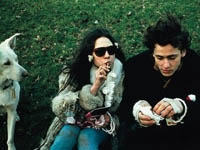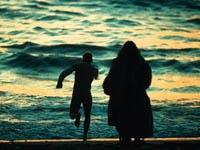|
 Not for Love nor Money
Not for Love nor Money
Philip Gröning's L'Amour, L'Argent, L'Amour
Elke de Wit
L'Amour, L'Argent, L'Amour (2000) was a hit in Germany this year, with the press praising everything from the actors to the director and plot. The titles were initially alluring, red and intercut with time-lapse firework flashes of a city on New Year's Eve. Helped by a restless camera, the viewer soon realises that it isn't going to be a "sit down and relax" type of experience.
David, an unemployed scrap metal wimp with his arm in plaster (Florian Stetter) and Marie, an impish, cutsie prostitute, (Sabine Timoteo) meet and spontaneously decide to leave town together. Normally couples elope romantically into the sunset or run adventurously away together, but  this couple drive off into the snowy, bleak landscape. Copious shots of roads at night ensue (for this is a "road movie"). this couple drive off into the snowy, bleak landscape. Copious shots of roads at night ensue (for this is a "road movie").
David initially doesn't like Marie prostituting herself, but suddenly he accepts it. He buys himself an expensive pair of boots and treats a cabbie to dinner whilst she "services" a client. At one point, the couple let a torn DEM 100 note flutter away in the wind, because they can't be bothered to stick it back together again.
A passionate nerd
The story is very limply connected by the lead characters. It seems more often like a series of events edited together, and could probably have worked just had it been a slide show. It was virtually impossible to sympathise with either David or Marie. David is simpering and inadequate and I kept wondering why Marie, who was at least gutsy, would want to drag him around with her. It certainly isn't for his body.
The dialogue is sparse, and occasional scenes of passion and laughter seemed unreal and disconnected.  This lack of communication between the characters also made it hard for them to communicate with the audience, something compounded by the fact that both actors spent a lot of time looking down or away from the camera. As a result, we are never really "let in" to see what they are thinking, and they came over as being two-dimensional and bland. This lack of communication between the characters also made it hard for them to communicate with the audience, something compounded by the fact that both actors spent a lot of time looking down or away from the camera. As a result, we are never really "let in" to see what they are thinking, and they came over as being two-dimensional and bland.
Unconvincing
 Apart from this, there were various, to my mind, hiccups in credibility. Marie does not recognise a visitor as a rival pimp: how naive would she be? David and Marie always have filthy hands and fingernails, even when the are staying in decent digs and seem clean in all other respects. After David has been extremely badly beaten up, he is still able to gently stroke Marie. He is also immediately capable of getting into a car and driving off. Marie is still laughing after she has been raped. They drive through France, but even though it's freezing cold at night, they still take all their clothes off in the car before going to sleep. Apart from this, there were various, to my mind, hiccups in credibility. Marie does not recognise a visitor as a rival pimp: how naive would she be? David and Marie always have filthy hands and fingernails, even when the are staying in decent digs and seem clean in all other respects. After David has been extremely badly beaten up, he is still able to gently stroke Marie. He is also immediately capable of getting into a car and driving off. Marie is still laughing after she has been raped. They drive through France, but even though it's freezing cold at night, they still take all their clothes off in the car before going to sleep.
After a fun tour of Paris, the only visually stimulating interlude illustrated by individual snapshots and other adventures, David and Marie eventually arrive at a beach, where they become sensible and decide to cook a
healthy meal of a whole chicken and rice(!) over an open fire. (I asked myself where all the lovely dry wood and coals appeared from.) The glowing coals are eventually taken back into the car to keep David and Marie warm, but unsurprisingly the car catches fire. David rushes back to it, (accompanied by choral music) as it is reaching its final explosions, in order to rescue Marie's fur coat.
They walk away and discover a deserted, wood-built holiday village. Dry shelter at last. A bottle of booze is discovered which they cleverly pour all over the floor and light in order to keep warm. The finishing touches are provided by Marie, who burns her last DEM 500 note in this new  fire. She then poignantly asks David: "David, do you know where we are?" and he answers: "When I dream, I know where I am," an answer that epitomises the cod philosophy prevalent throughout L'Amour, L'Argent, L'Amour. fire. She then poignantly asks David: "David, do you know where we are?" and he answers: "When I dream, I know where I am," an answer that epitomises the cod philosophy prevalent throughout L'Amour, L'Argent, L'Amour.
To quote from the production notes: "Routine copulation alternates with the tender embraces of an arm in plaster. [...] A film that is really a kind of fairy-tale—how will these two children survive the winter." I challenge anyone to watch this film and care.
Elke de Wit, 30 April 2001
Also of interest:
Moving on:
|




 this couple drive off into the snowy, bleak landscape. Copious shots of roads at night ensue (for this is a "road movie").
this couple drive off into the snowy, bleak landscape. Copious shots of roads at night ensue (for this is a "road movie"). This lack of communication between the characters also made it hard for them to communicate with the audience, something compounded by the fact that both actors spent a lot of time looking down or away from the camera. As a result, we are never really "let in" to see what they are thinking, and they came over as being two-dimensional and bland.
This lack of communication between the characters also made it hard for them to communicate with the audience, something compounded by the fact that both actors spent a lot of time looking down or away from the camera. As a result, we are never really "let in" to see what they are thinking, and they came over as being two-dimensional and bland. Apart from this, there were various, to my mind, hiccups in credibility. Marie does not recognise a visitor as a rival pimp: how naive would she be? David and Marie always have filthy hands and fingernails, even when the are staying in decent digs and seem clean in all other respects. After David has been extremely badly beaten up, he is still able to gently stroke Marie. He is also immediately capable of getting into a car and driving off. Marie is still laughing after she has been raped. They drive through France, but even though it's freezing cold at night, they still take all their clothes off in the car before going to sleep.
Apart from this, there were various, to my mind, hiccups in credibility. Marie does not recognise a visitor as a rival pimp: how naive would she be? David and Marie always have filthy hands and fingernails, even when the are staying in decent digs and seem clean in all other respects. After David has been extremely badly beaten up, he is still able to gently stroke Marie. He is also immediately capable of getting into a car and driving off. Marie is still laughing after she has been raped. They drive through France, but even though it's freezing cold at night, they still take all their clothes off in the car before going to sleep.
 fire. She then poignantly asks David: "David, do you know where we are?" and he answers: "When I dream, I know where I am," an answer that epitomises the cod philosophy prevalent throughout L'Amour, L'Argent, L'Amour.
fire. She then poignantly asks David: "David, do you know where we are?" and he answers: "When I dream, I know where I am," an answer that epitomises the cod philosophy prevalent throughout L'Amour, L'Argent, L'Amour.